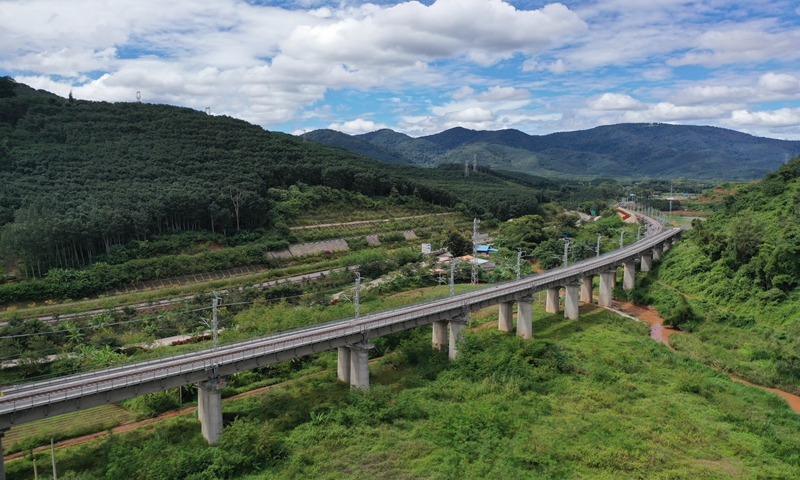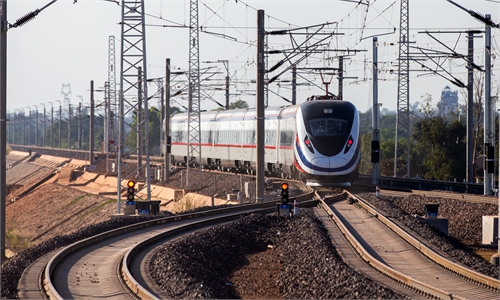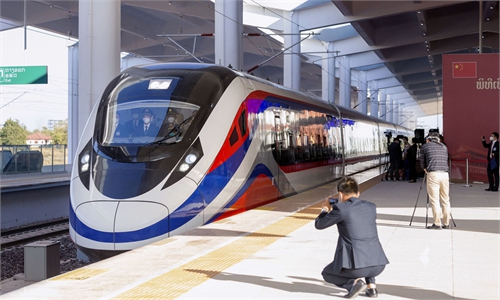
The China-Laos Railway in Xishuangbanna, Southwest China's Yunnan Province, on October 17, 2021 Photo: VCG
With the official opening of China-Laos Railway, a landmark, high quality project under the Belt and Road Initiative (BRI), Chinese tech firms are tapping into digital cooperation opportunities between the two countries made possible by the mega infrastructure achievement that are increasing the Southeast Asian country's ability to attract investment, create new jobs and accelerate economic growth.
One such example is a WeChat mini-program called "Traveling China-Laos Railway", developed by Yunnan Tengyun Information Industry Co, which was launched on Tuesday, aiming to create a dedicated online transnational tourism service platform for travelers along the China-Laos railway route, according to a report by yunnan.cn.
The mini-program includes translation and health code functionality, and not only provides services targeting rail passengers, but also acts as a platform for cultural and tourism resources in the areas along the route.

A screenshot of WeChat mini-program "Traveling China-Laos Railway"
With the opening of the new rail link, Laos' tourism industry is expected to benefit greatly from a stable source of passenger traffic.
Consul general of Laos in Kunming, capital of Southwest China's Yunnan Province, noted his high-hopes for the program, saying such app could actively promote the rich tourism resources of Laos and China, help deepen the tourism cooperation between the two countries, and contribute to the economic and social development of both nations.
The consulate will also provide support for future cooperation between Yunnan Tengyun and digital firms based in Laos.
Chinese technology giant Huawei has also been actively involved in China-Laos BRI projects, according to media reports.
The new China-Laos rail link features Huawei smart railway solution, a technology suite that boosts safety and security from the construction stage to the operational phase. Huawei has worked closely with Laotian telecom operators to build a high-speed network along the high-speed line. Experts have noted that the stable connection will benefit rail passengers, as well as rural residents living in along the route.
The project director of Huawei Laos, Somlith Nammanininh said: "As a Laotian, I am very excited that there is finally a railway in my motherland, this was out of my expectations just a few years ago. I believe the railway will foster the economy, help Laos to integrate into the global market, and create more opportunities for local businesses and people. As a Huawei employee who participated in the network construction of the whole railway, I look forward to seeing the merge of digital technology and modern transportation bring a brighter future to the country."
Huawei established its wholly-owned subsidiary, Huawei Technologies (Laos) Sole Co in 1998 and currently employees150 staff, among whom 70 percent are locals.
From internet infrastructure like optical fiber, base stations to advanced technologies including 5G and artificial intelligence, there remains huge scope for the two countries to collaborate, amid the booming demand for digital transformation solutions among the Association of Southeast Asian Nations (ASEAN), Xu Liping, director of the Center for Southeast Asian Studies at the Chinese Academy of Social Sciences in Beijing, told the Global Times on Thursday.
Myanmar and Laos tend to lag behind among ASEAN members in digital development, and there are many opportunities for Chinese tech firms to tap into supporting their transformation, Xu noted.
Lao Minister of Technology and Communications Boviengkham Vongdara has highlighted the need for Laos to accelerate digital transformation in association with sustainable economic development, while attending the ITU Digital World 2021 conference in October.
Although the COVID-19 has led to some impact on regional economic and trade cooperation, digital cooperation will provide a new impetus for the even stronger development of China-Laos trade, investment and tourism ties, Xu said.
In 2020, bilateral trade volume between China and Laos reached $3.55 billion. China has become the second largest trading partner and largest source of foreign direct investment (FDI) for Laos. In 2020, Chinese FDI to Laos was worth $1.24 billion, official data showed.



